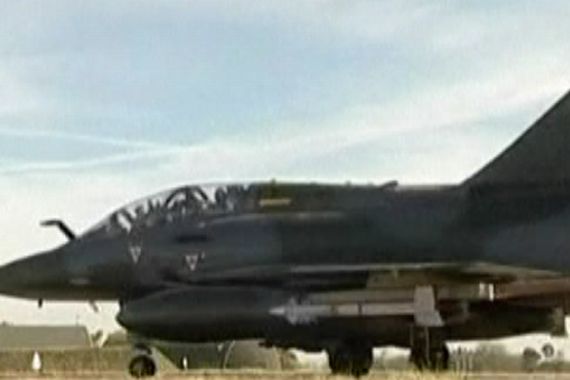Europe divided over Libya mission
Divisions arise between coalition carrying out military action and other world powers over UN-sanctioned operation.

The international military campaign in Libya has created apparent divisions between coalition leaders carrying out the UN-sanctioned operation and other world powers.
The UN-backed air raids mounted so far against forces loyal to Libyan leader Muammar Gaddafi have been carried out by Britain, France and the US, acting outside of their NATO roles.
Calls for the NATO alliance to take over the enforcement of the no-fly zone have been declined by Turkey, while other members have expressed concerns over whether NATO aircraft and equipment would be diverted from other missions, including the one in Afghanistan.
William Hague, the British foreign minister, refused on Monday to rule out using the coalition air raids to target Gaddafi, saying it depended on “circumstances at the time”.
But Robert Gates, the US defence secretary, said such action would be “unwise” and Laurent Teisseire, the French defence ministry spokesman, said “the answer is no,” when asked about the subject.
Medieval ‘crusade’
In Russia, Vladimir Putin, Russia’s prime minister, criticised the UN resolution that sanctioned the use of force in Libya, calling it a “medieval call to crusade”.
“The resolution by the Security Council, of course, is defective and flawed,” Russian news agencies quoted Putin as telling workers on a visit to a missile factory.
“To me, it resembles some sort of medieval call to crusade when someone would appeal to someone to go to a certain place and free someone else.”
Dmitry Medvedev, the Russian president, later said the reference to “crusades and so forth” was unacceptable, but although it appeared to be a rebuke, he did not mention Putin by name.
Al Jazeera’s Laurence Lee, reporting from Brussels, said: “There’s lots of cracks just developing, some of them inside the European Union and some of them outside.
“The comments by Vladimir Putin, for example – who is prime minister, remember, he’s not the president so he’s supposed to be in charge of domestic, not foreign policy … demonstrate how this campaign in Libya is driving wedges between people who are supposed to be allies nowadays.”
The UN resolution imposing the no-fly zone on Libya was passed after Russia, which has a veto, abstained during the Security Council vote.
‘Gaddafi not a target’
As the military campaign continued in Libya, world leaders sought to reiterate the aim of the operation.
British General Sir David Richards, the head of Britain’s armed forces, said on Monday that Gaddafi was “absolutely not” a target for military action.
The US has also said that the military operation is not aimed at regime change, but at enforcing a no-fly zone to protect Libya’s civilian population from attacks by Gaddafi forces.
However, Barack Obama, the US president, said on Monday that the UN mandate authorising the no-fly zone is clear, and that the Libyan leader “needs to go”.
Obama also said that the US expects to transfer its lead role in the military action on Libya to its allies.
“We anticipate this transition to take place in a matter of days and not in a matter of weeks,” he said.
Elsewhere, Amr Moussa, the Arab League chief, questioned the need for a bombardment of positions in Libya by coalition forces, saying they risked killing civilians.
The US has said there is no evidence civilians in Libya have been harmed in the air assault.
Meanwhile in Germany, Guido Westerwelle, the country’s foreign minster, speaking in Brussels, defended his country’s decision not to back air raids against Gaddafi’s forces.
He said that the Arab League criticism of the air attacks had vindicated Germany’s reluctance to back the action, but that Germany stood with other European Union countries in tightening sanctions against the Libyan government.